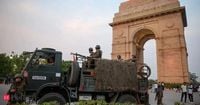In a significant escalation of military and diplomatic tensions, India has declared that any future act of terrorism will be treated as an "act of war" against the nation. This bold announcement was made on May 10, 2025, by top government sources, marking a critical shift in India's national security policy.
The decision comes in the wake of a deadly terror attack that occurred on April 22, 2025, in Pahalgam, Jammu and Kashmir, where 26 civilians, primarily tourists, lost their lives. The Indian government, led by Prime Minister Narendra Modi, aims to establish clear red lines regarding terrorism and signal its intention to respond decisively to any future attacks.
During a meeting held on the same day, Prime Minister Modi convened with key defense officials, including Union Defence Minister Rajnath Singh and National Security Advisor Ajit Doval, to discuss the ongoing crisis with Pakistan and formulate a robust response strategy. This meeting followed a series of Indian airstrikes targeting six Pakistani airbases, which were executed in retaliation for Pakistan's recent missile and drone attacks against Indian military and civilian infrastructure.
Colonel Sofiya Qureshi of the Indian Army confirmed the success of these precision strikes, known as Operation Sindoor, which targeted military sites such as Murid Airbase, Rafiqui Airbase, and radar installations at Pasrur and Sialkot. The operation was a direct response to Pakistan's aggressive military actions, which included the use of high-speed missiles and drones to strike various locations in India.
"Pakistan's military has shown an irresponsible tendency by targeting civilian infrastructure, including hospitals and schools in airbases," Colonel Qureshi stated during a press briefing. The Indian armed forces managed to neutralize these threats effectively, with limited damage reported to their own air bases in Udhampur, Pathankot, and others.
As tensions continued to rise, reports indicated that Pakistan had been observed moving troops into forward positions along the border, further exacerbating the situation. Wing Commander Vyomika Singh highlighted that Pakistan's provocations, including drone strikes and missile launches, were designed to challenge India's military readiness.
The Indian government has made it clear that any future terrorist act, including bombings, shootings, flight hijackings, or cyber attacks, will be considered a declaration of war. This policy not only emphasizes military readiness but also aims to expose the duality of the Pakistan Army, which, while presenting itself as a responsible actor internationally, allegedly supports terrorist groups operating within its territory.
In a related development, Pakistan's Foreign Secretary Vikram Misri condemned the escalation of violence, labeling it as "provocative" and asserting that Pakistan's actions were defensive in nature. Despite calls for restraint from various international players, the situation remains volatile, with both nations on high alert.
Moreover, Indian intelligence reports suggest that Pakistan is still fueling unrest through proxy terrorism, with indications that terrorists in Kashmir have been instructed to launch fresh attacks. This strategy appears to be aimed at diverting attention from the ongoing military confrontations along the borders.
The recent military actions by India, including Operation Sindoor, are seen as a direct response to a pattern of aggression from Pakistan, which has included coordinated drone and missile attacks targeting Indian infrastructure. The Indian Armed Forces have demonstrated their capability to conduct precision strikes deep into enemy territory, effectively neutralizing threats and asserting India's military strength.
In a show of resolve, the Indian government has vowed to continue its decisive response to any future aggression, reinforcing the message that acts of terrorism will not be tolerated. As intermittent firing continues along the Line of Control (LoC), the international community watches closely, aware that the potential for escalation between these two nuclear-armed neighbors remains high.
In summary, India's new policy on terrorism marks a significant and potentially dangerous shift in its military doctrine. By categorizing future acts of terror as acts of war, India has set a precedent that could lead to more direct military confrontations with Pakistan. As both countries navigate this tense landscape, the implications for regional stability and international relations remain uncertain.






